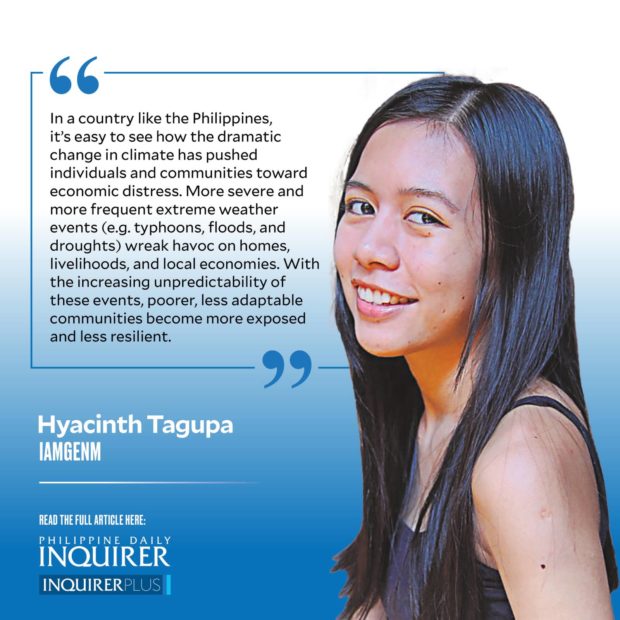Climate change and the common Filipino

It’s hard to think about climate change in this time of soaring unemployment, shuttered businesses, and worsened poverty. But we all have to concern ourselves with climate now, because it is no longer just some vague realm of scientists and world leaders. It has become an economic problem, one that’s already hurting all of us, especially the poor, in profound ways.
Various analyses show that climate change is widening the wealth gap, particularly making poor countries poorer. One 2019 study from Stanford University found that from 1961 to 2010, the per-person wealth in the world’s poorest countries decreased by as much as 30 percent due to global warming.
In a country like the Philippines, it’s easy to see how the dramatic change in climate has pushed individuals and communities toward economic distress. More severe and more frequent extreme weather events (e.g. typhoons, floods, and droughts) wreak havoc on homes, livelihoods, and local economies. With the increasing unpredictability of these events, poorer, less adaptable communities become more exposed and less resilient.
Not only does climate change inflict costly damage and destroy livelihoods, it also threatens our food security. Our agriculture sector takes a hit with every flood and drought, while our aquatic food sources suffer from the warming and acidification of marine habitats. In addition, vector-borne diseases such as dengue find more conducive environments in warmer tropical climates like ours.
All these have domino effects on the day-to-day life of the average Filipino, including food access, health and medical care, productivity, childcare and education, and more.
It is high time to think of climate change as an economic issue, and for Filipinos to include this issue in political (not partisan) decision-making.
How is climate response a political decision? For so long, the narrative on climate change focused on the responsibility of the individual: Each person must choose eco-friendly products, conserve energy, plant trees, and so on. It is clear now that individual action can only go so far; without concrete policy from governments and political will to effect meaningful solutions, our individual actions can only scratch the surface of the issue.
Fr. Jett Villarin, one of the country’s foremost climate scientists and who has worked with the Intergovernmental Panel on Climate Change, emphasized this in a briefing last week: “Climate action cannot just be individual. It has to be organized, it has to be collective… We need good policies, we need good governance.”
In terms of climate, good governance involves national and local government leaders who listen to scientists in crafting climate laws and regulations—and actually enact them.
So far, environmental laws in the country have been feebly implemented. For example, the Ecological Solid Waste Management Act has barely put a stop to open dumping and open burning of waste, and the Revised Forestry Code has not deterred illegal lumber-cutters even in protected forests.
Further, good climate governance entails not only the mitigation of global warming factors but also adaptation strategies for citizens already living in a warmer world. As we are now experiencing the effects of climate change, how can we adapt? Adaptation strategies include disaster risk management, water utility management, protection of ecosystems, and support for sustainable agriculture.
Our local and national government leaders have to hear our strong public demand for effectual climate governance. Besides participating in visible advocacy, one of the ways to express our demand is through our vote. Already, we are seeing who among our politicians have included climate action in their priorities, who have failed their climate promises, and who have shown no regard at all for the climate crisis.
We, the common Filipino, must own the issue of climate change. It is not just scientists and academics who perceive its effects. It is us who are burdened economically, immensely, by the shortage of climate action.
—————
hyacinthjt@gmail.com




















